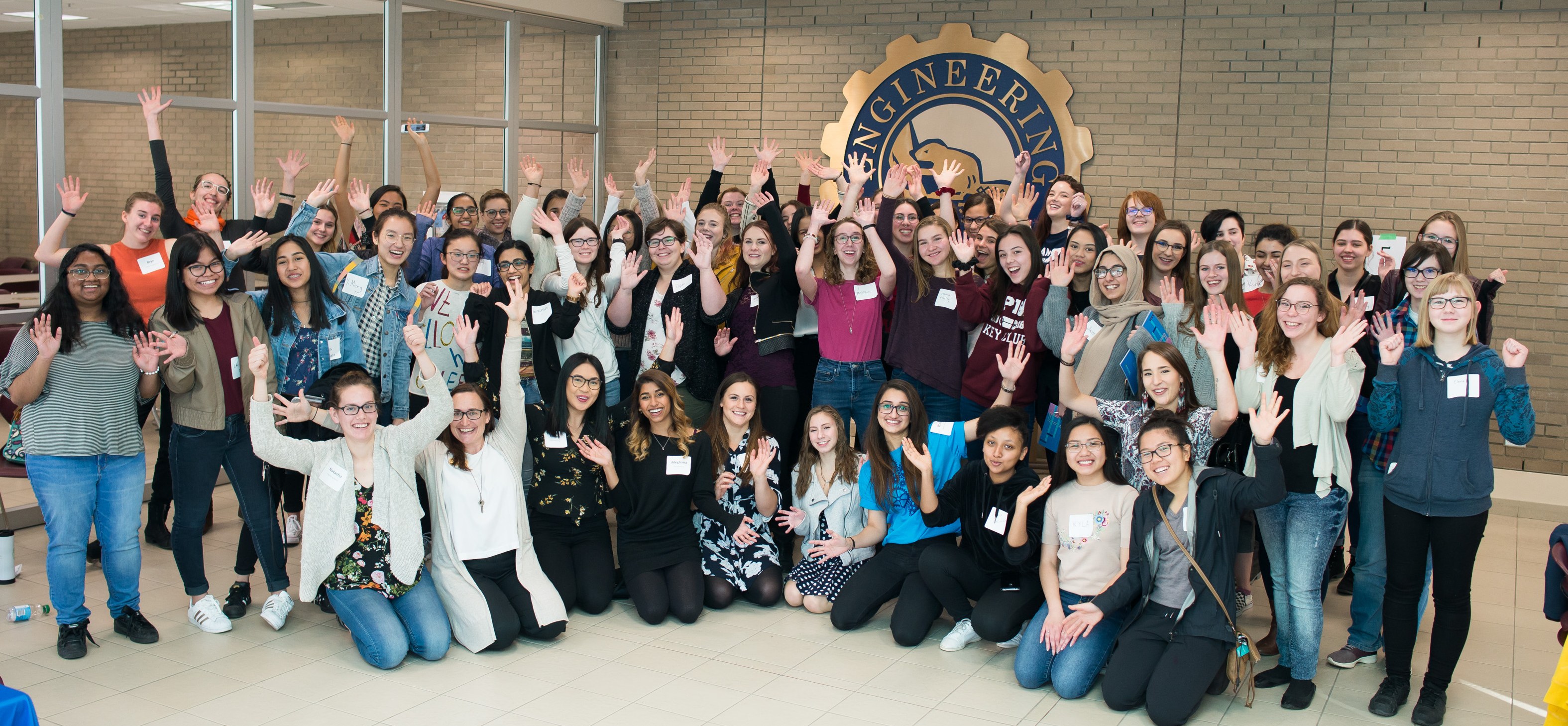
Young women help one another in a supportive community at UAlberta. The Engineering at Alberta Females Engineering Mentorship program informs and inspires young women about how they can make a difference through engineering.
(Edmonton) High school students trying to choose a path for their future can find themselves in a near-perpetual state of confusion and frustration.
That's why women in the engineering program at the University of Alberta are reaching out and mentoring young women in high schools-to empower them to make informed decisions about their future, and to consider a career in engineering.
Many of the female Engineering at Alberta students serving as mentors vividly recall struggling to make key decisions about their own futures.
"I had no idea that engineering was even an option for me," said Heidi Cossey, a mining engineering graduate student.
Cossey grew up in a small Alberta town and lacked female role models in science, technology, engineering and math (STEM). "Without any female role models or mentors in STEM, I almost didn't end up in a STEM career. Even though I was much better at math and science, I went into Arts.
"If I had a mentor in high school who encouraged me to pursue STEM, it would have made a world of a difference and I would have pursued engineering straight out of high school."
With the Female Engineering Mentorship (FEM) program, female high school students can receive the mentorship and support they need to fulfil their passions with confidence and a supportive community.
FEM was created in 2018 by Cossey and Faculty of Engineering Director of Programs and Planning Nicole Dyck. The program has about 25 female engineering students who are mentoring approximately 50 female high school students.
"We wanted to create an opportunity to bring high school students together as part of a community, but also empowers them to see themselves as engineers," said Dyck.
FEM works to make engineering a viable option for female high school students by educating them on what engineering is and how engineers serve society.
The FEM program pairs high school students from Western Canada with female engineering student mentors who have a shared interest or common connection, said Dyck.
"Not only do you get to connect with your own incredible mentor, but you are also connected with a network of peers and inspirational women," Cossey said.
Their relationship covers anything and everything, from recipes to student clubs. "But at the core, it's all about debunking myths and giving women a safe space to talk about their ambitions but also about fears and anxieties that may accompany those ambitions," Dyck said.
The program uses mentorship to change the misconceptions high school students might have about engineering, and mentors answer commonly asked questions about engineering.
There's more than one path for people to take in engineering, and FEM helps show girls this through its mentors with diverse experiences. "It's through their experiences that these girls are able to see there are many ways to be an engineer," Dyck said.
"The FEM mentors are truly amazing young women," said Cossey.
"We have mentors who have worked overseas in Europe and Africa, mentors who are building satellites that are being used in space. One of our mentors this year will be mentoring remotely-because she will be working for Tesla. One of our mentors went to Bolivia, I believe three separate times, to build bridges. And these mentors are just getting started. They haven't even graduated yet."
Jaime Hicks, a fourth-year environmental engineering student, has been a FEM mentor since its inaugural year, developing a strong relationship with her mentees and going out of her way to make a difference in their lives.
She answered their questions over email, helped build their class schedules, and prepared them with a swag bag filled with important information and goodies to help them transition into university.
Hicks recognizes the importance of mentorship, especially in a field in which women are under-represented, which inspires her to influence the young women around her.
"If you're a woman and see you another woman doing it, you already have a similarity, so you can already identify with that person. Whereas if it's a woman looking at a man's accomplishments, there is a disconnect-even if you're friends, even if you know the person.
"There needs to be more female representation, especially in mentorship, just so you know that it's not just the stereotype that goes into that field. Anyone can do it."